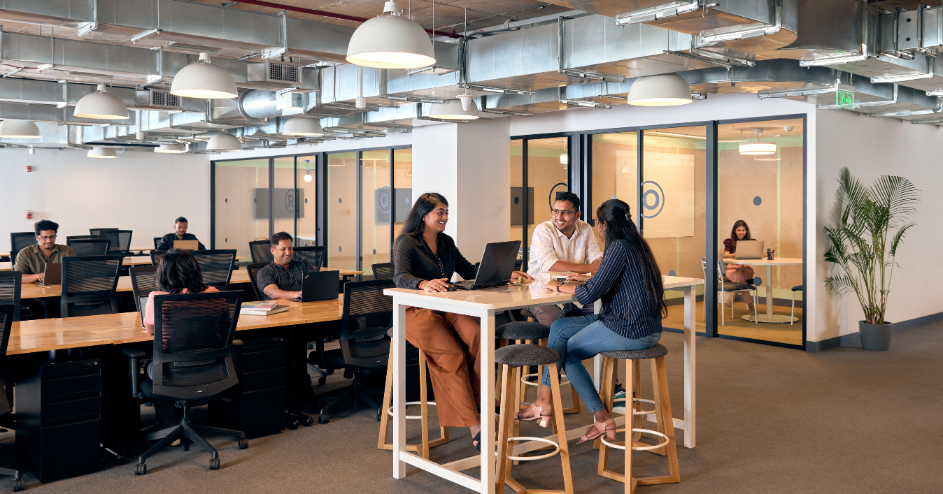WEWORK LABS
India’s AI Startup Ecosystem: Growth, Trends & Investment

India’s AI based startups are scaling fast. Know the key trends, investment opportunities, and how the AI startup ecosystem is evolving to reach the global markets.
Introduction
It’s clear that we have officially entered the age of artificial intelligence. Generative artificial intelligence (GenAI) models like ChatGPT, Gemini, and Perplexity are now common elements in everyone’s everyday life, and for some, an indispensable part of living.
This has had its effects on an enterprise level too. AI’s ability to summarize, code, reason, engage in a dialogue, and make choices has made it a desirable element for inclusion in standard workflows, some of which could easily be taken over by AI—in the future. Most enterprises are viewing artificial intelligence as a technology that can take over from humans in the long term as opposed to short term. A survey by McKinsey found that while the majority of companies wanted to involve AI in their operations, less than 1% of them viewed their company as ready and able to adopt artificial intelligence. This gap highlights not just a readiness issue, but also raises questions about scalability—especially when, in contrast, AI-based service providers often enter the market with a clear plan to scale rapidly and plug into this unmet demand.
So how do AI based startups find their grounding and what are some of the challenges they foresee?
Also Read: Hidden Challenges of Scaling Startups in India
How are startups navigating the AI cosmos
“Something changes within artificial intelligence every week,” says Himanshu Goel, Founder of Futr Studios, a company that operates in the realm of digital marketing through virtual avatars. As a founder, Himanshu says it is important to keep up with the changes while they happen. Enterprises as a whole have also acknowledged and accounted for the speed with which AI disruption is currently taking place. The same study by McKinsey from earlier suggests that many executives expect substantial AI-driven transformation over the next few years, with 92% planning to increase AI investment, reflecting an ongoing and growing influence rather than a one-time event.
For startups this means that they would have to be in a state of constant iteration.
It might be easier to set up a non-traditional roadmap like working for the quarter or working for demand as opposed to following a traditional roadmap given how much disruption happens in AI, notes Krish Ramachandran, CEO and Co-founder of Saas22 Inc, an AI-powered distribution marketplace for SaaS companies.
Another key challenge is standing out. Given the rampant rate at which disruption happens, differentiation becomes a moving target. Startups are not only racing to innovate, but also to communicate their unique value proposition before the market shifts again.
Also Read: Creator Economy in India and InVideo’s Meteoric Rise
The B2C artificial intelligence wave is unfolding
Post-2022, AI based startups in India have been steadily finding their ground. In the last three years, these companies have been raising capital, growing their teams, and building large-scale businesses with artificial intelligence at their core. A significant reason why the AI startup ecosystem in India has picked up momentum is the government’s proactive stance on nurturing innovation through grants, policy support, and national AI missions.With the entry of AI models like Deepseek, the artificial intelligence (AI) has heated up like no other. There is ample evidence to suggest that AI in startups is here to stay. There are several startups leveraging AI today to improve their tasks and get ahead of them.
We have also spoken about this in a previous article, which you can read here.
The availability of talent has played a foundational role in enabling Indian AI-based startups to build, test, and iterate on products rapidly. This strong technical base has contributed to making India’s AI startup ecosystem one of the most dynamic globally—drawing significant investor interest in ventures that deliver real-world utility. Crucially, this ecosystem doesn't operate in a vacuum; it’s supported by a growing and curious consumer base.
A survey by LocalCircles found that 1 in 2 Indian users are adopting AI for several different reasons ranging from looking for information to summarising documents, among other use cases. This demonstrates a readiness to adopt these innovations at scale and, in turn, encourage startups to meet that demand with speed and relevance. That being said, adoption of AI also means creating a workforce that is ready and willing to upskill themselves to meet the needs of an evolving workforce. The creation of India AI signals a willingness to adopt these measures more strongly and work across upskilling the workforce across four main areas: foundational skills, current in-demand skills, emerging skills, and digital skills.
“I think India is one of the best markets for going direct-to-consumer. You can start small, reach customers almost immediately, and test with diverse audiences at relatively low cost. That said, the real challenge in India is finding paying customers. But we've done some experiments, and if you offer the right value, people are willing to pay,” said Himanshu.
The trust and confidence in artificial intelligence has had trickle-down effects on how consumers are making purchase decisions. Around 62% of Indians said that they made purchase decisions influenced by AI, according to one EY report—with many consumers rating choices made by artificial intelligence to be extremely valuable.
That being said, there are some outliers. In a study commissioned by OpenAI and MIT, key findings revealed that a small subset of users have developed a very real dependency on these artificial intelligence models, with a joint statement issued by them flagging concerns that a small section of users of ChatGPT depicting problematic behaviours while using the model—this includes addiction, preoccupation, withdrawal symptoms, loss of control, and mood modification. As India’s B2C AI ecosystem matures, the path forward lies in balancing innovation with responsibility. Some AI companies are beginning to acknowledge these risks, exploring features such as usage tracking, wellness nudges, and time-based alerts to promote healthier engagement. The path forward lies in balancing innovation with responsibility—ensuring that rapid technological advancement is matched by thoughtful design and ethical safeguards.
So what’s happening on the B2B side of things?
B2B has some catching up to do
It’s also clear that the B2B segment has a lot of catching up to do. A significant reason for this lag is the longer sales cycles and the more complex integration requirements that B2B AI solutions often entail. On a global level, adopting AI is seen as a greater challenge, with several points of friction emerging as companies look to adopt AI.
According to a study by Deloitte, adoption of AI can also be seen as a significant barrier due to the evolving nature of this technology. Constant updates, lack of standardised protocols, and difficulties in aligning AI capabilities with legacy systems contribute to the slow pace of implementation. Moreover, B2B buyers often demand a higher level of explainability, security, and compliance — especially in regulated industries — making the deployment process more rigorous.
However, the upside remains promising. As tools mature and integration frameworks improve, B2B firms that invest early in scalable AI infrastructure may gain a significant competitive edge. The challenge for these companies will be to bridge the gap between experimentation and enterprise-grade deployment — turning AI from a buzzword into a bottom-line driver.
Generative AI and other automation tools are transforming the sales process by saving time and enhancing the quality of conversations. These technologies can pull together key insights from diverse sources—like service tickets, transaction histories, and customer interactions—and present them in a streamlined, digestible format. Large language models (LLMs) can go a step further by drafting talking points, suggesting responses to common objections, and helping sellers prepare more efficiently, all without compromising the depth or personalization of the conversation, another study from McKinsey found.
WeWork Labs Take
India’s AI startup ecosystem stands at an inflection point—brimming with opportunity, yet shaped by unique structural and operational constraints. While consumer-focused startups are sprinting ahead with agility, experimentation, and grassroots adoption, B2B ventures are navigating a more measured path, hindered by complexity but poised for depth and long-term value. What unites both ends of this spectrum is the need for relentless iteration, clarity of purpose, and a grounded understanding of India’s diverse market realities. At WeWork Labs, we see the next wave of growth being defined not just by code or capital, but by a startup’s ability to adapt, scale responsibly, and solve for India’s real-world challenges with AI that works for people—across sectors, contexts, and constraints.
Image credit: Pexels
Related Blogs:

WEWORK LABS
With the Indian startup ecosystem gaining maturity, there are a number of things changing—startups are thinking more global in their ambitions, more companies are taking their companies to the market

WEWORK LABS
India may be home to unicorns and cutting-edge tech, but at its core, it's still a nation of farmers — with over 50% of the population dependent on agriculture.

